Jan 07, 2026
Jan 07, 2026
Director: Luchino Visconti / Italy/Italian/187mts
Arguably Luchino Visconti's best film and certainly the most personal of his historical epics, The Leopard chronicles the fortunes of Prince Fabrizio Salina and his family during the unification of Italy in the 1860s. The film won the Palme d'Or at the Cannes Film Festival in 1963.
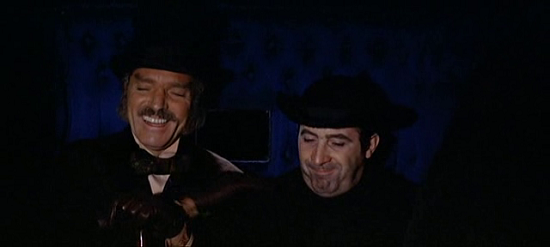
Prince Salina with Father Pirrone
Adapted from Giuseppe Tomasi di Lampedusa highly acclaimed novel by Visconti and no fewer than four co-scenarists, The Leopard is the epic saga of Prince Salina's slow fade from aristocratic prominence set against and hastened by the reunification of Sicily after beating back Austrian occupiers and their Bourbon sympathizers in the north. The Prince and his family have generally been able to avoid the raging conflict by remaining ensconced on their palatial estate where they are tended to by various workers, servants, and a live-in priest, the companionable Father Pirrone (Romolo Valli). But the beckoning glory of the battlefield finally proves irresistible to Salina's nephew, Tancredi (Alain Delon), who joins up with Giribaldi's red-shirt guerillas. Though Giribaldi represents a bold move in a politically progressive and, therefore, disadvantageous direction for Salina, he pragmatically recognizes the value in siding with the soon-to-be victorious elements; thus, Tancredi enlists with his uncle's blessing.
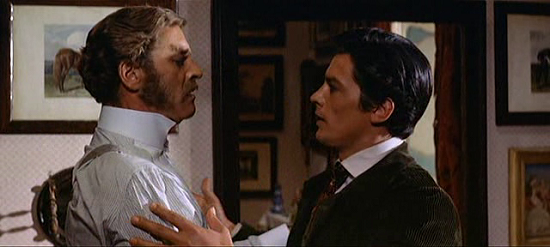
The Prince with his nephew Tancredi
Wisely understanding the necessity of first-act spectacle to draw his audience into his otherwise stately paced picture, Visconti stages a sensational piece of urban warfare composed largely in long shots and overhead angles, enabling the viewer distance through which one might gain a sense of war's cruel and random grandeur. Tancredi is wounded during the skirmish, though not badly; however, when he returns home, his brave service proves valuable to moving the family past red-shirt roadblocks as they travel through sweltering heat to their ludicrously enormous mansion in Donnafugata. There's already a palpable feeling of change in the air at Donnafugata, but the family still receives their expected and quite extravagant welcome, replete with a special church service.
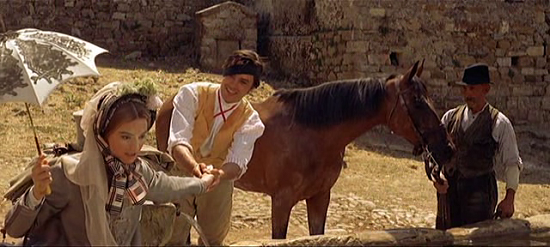
Tancredi teasing Price's daughter Concetta
As the family luxuriates in their dusty, dilapidated paradise, the question of Concetta's, Salina's daughter, possible betrothal to Tancredi arises. Though there is some degree of romance burgeoning between the two, Salina is concerned that the timid and unrefined Concetta, whom he warmly describes to Pirrone as if she were the family dog, is inadequate for the ambitious Tancredi. Indeed, there is no woman even remotely in the running until the family is reintroduced to the suddenly, and smolderingly, mature daughter of the gauche Don Calogero, Angelica (Cardinale).
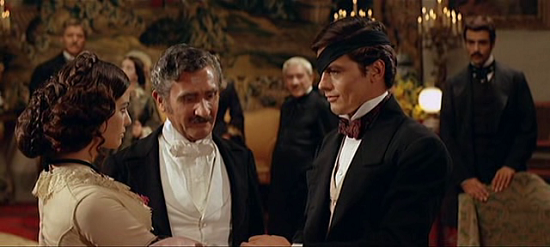
Tancredi meeting Don Calogero Sedara and his daughter Angelica
Tancredi starts courting the beautiful Angelica (Claudia Cardinale), a daughter of the town's newly appointed Mayor, Don Calogero Sedara (Paolo Stoppa). Spellbindingly gorgeous, Salina is forced to concede that Angelica, bolstered by her father's nouveau riche fortune (much of which is due to Salina), represents the most fiscally agreeable match for Tancredi.
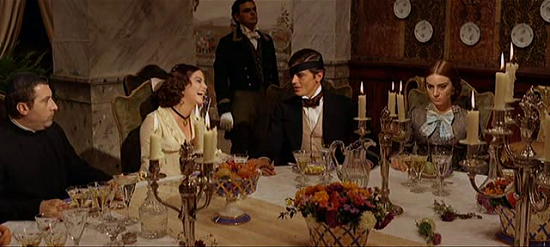
Tancredi sharing a fun moment with Angelica while Concetta sits restless
The prince sees the dashing and entrepreneurial Tancredi as his heir and nurses poignant hopes that the patrician spirit and energy of his own class will survive in Tancredi's political career, but is clearly not ready to abdicate from his own existence. This emerges in the prince's frank admiration for Angelica's beauty and the remarkable sequence in which he dances a waltz with her during the final, magnificent extended ball scene: a moment replete with political and erotic meaning.
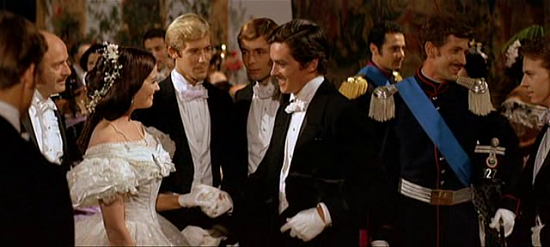
Tancredi with Angelica during the ball
Painfully realizing the aristocracy's obsolescence in the wake of the new class of bourgeoisie, the Prince later declines an offer from a governmental emissary to become a senator in the new Parliament in Turin. The rest of the film proceeds as the Prince's inexorable march to irrelevance and, essentially, death.
The closing section, an almost hour-long ball, is often cited as one of the most spectacular sequences in film history. Burt Lancaster (as the Prince) is magnificent in the first of his patriarchal roles, and the rest of the cast, especially Alain Delon (as Tancredi) Claudia Cardinale (as Angelica), become almost perfect incarnations of the novel's characters.
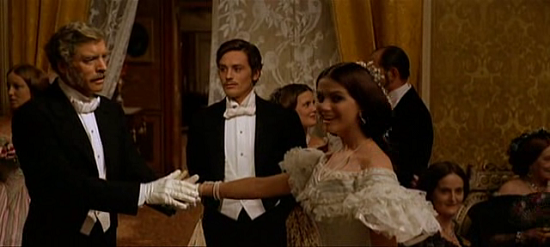
Angelica invites the Prince to dance with her
Visually, The Leopard is a sumptuous creation, featuring brilliant contributions from Visconti's usual band of collaborators. Giuseppe Rotunno's influential cinematography is a vivid mixture of bright, dusty exteriors and chiaroscuro interiors, enhancing Visconti's remarkably assured and fussily blocked compositions Filmed in glorious Techniscope and rich in period detail, the film is a remarkable cinematic achievement in all departments. The battle scenes at the beginning of the film are awe-inspiring and presented in exquisite symmetry to the subtle, socio-psychological battle-ground of the ball, in which the Prince's caste are in full retreat.
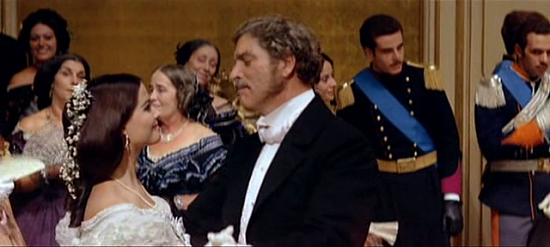
Angelica dances with the Prince
The screenplay, co-authored by Visconti, is full of insights about Sicilian life and culture, and cinematographer Giuseppe Rotunno conjures a dazzling vision of the harshly beautiful landscape, to be revisited in the next decade by Coppola. A masterpiece in the truest sense of the word, "The Leopard" is an example of magisterial filmmaking and is certainly the director Luchino Visconti's most opulent - and most respected - film.
A series of Hundred Favorite Films Forever"
22-Dec-2012
More by : P. G. R. Nair